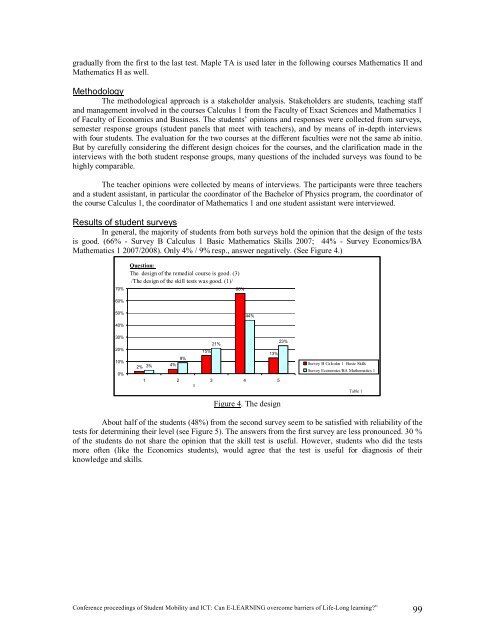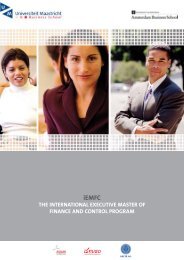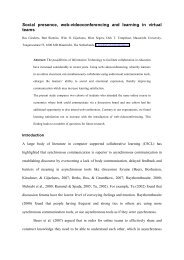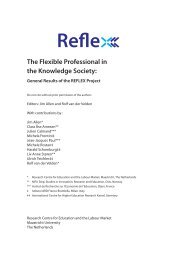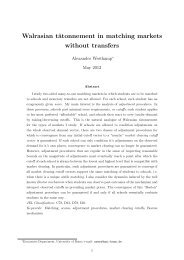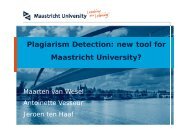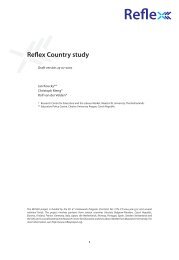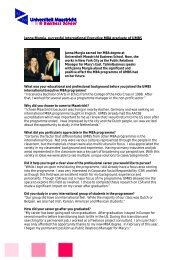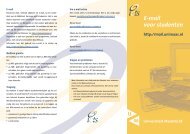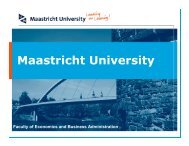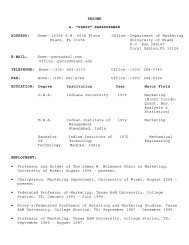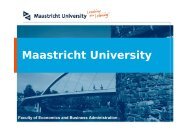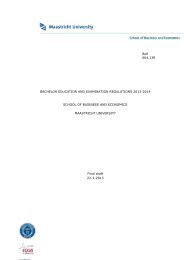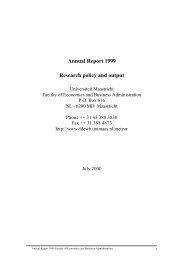proceedings of Student Mobility and ICT: Can E-LEARNING
proceedings of Student Mobility and ICT: Can E-LEARNING
proceedings of Student Mobility and ICT: Can E-LEARNING
You also want an ePaper? Increase the reach of your titles
YUMPU automatically turns print PDFs into web optimized ePapers that Google loves.
gradually from the first to the last test. Maple TA is used later in the following courses Mathematics II <strong>and</strong><br />
Mathematics H as well.<br />
Methodology<br />
The methodological approach is a stakeholder analysis. Stakeholders are students, teaching staff<br />
<strong>and</strong> management involved in the courses Calculus 1 from the Faculty <strong>of</strong> Exact Sciences <strong>and</strong> Mathematics 1<br />
<strong>of</strong> Faculty <strong>of</strong> Economics <strong>and</strong> Business. The students’ opinions <strong>and</strong> responses were collected from surveys,<br />
semester response groups (student panels that meet with teachers), <strong>and</strong> by means <strong>of</strong> in-depth interviews<br />
with four students. The evaluation for the two courses at the different faculties were not the same ab initio.<br />
But by carefully considering the different design choices for the courses, <strong>and</strong> the clarification made in the<br />
interviews with the both student response groups, many questions <strong>of</strong> the included surveys was found to be<br />
highly comparable.<br />
The teacher opinions were collected by means <strong>of</strong> interviews. The participants were three teachers<br />
<strong>and</strong> a student assistant, in particular the coordinator <strong>of</strong> the Bachelor <strong>of</strong> Physics program, the coordinator <strong>of</strong><br />
the course Calculus 1, the coordinator <strong>of</strong> Mathematics 1 <strong>and</strong> one student assistant were interviewed.<br />
Results <strong>of</strong> student surveys<br />
In general, the majority <strong>of</strong> students from both surveys hold the opinion that the design <strong>of</strong> the tests<br />
is good. (66% - Survey B Calculus 1 Basic Mathematics Skills 2007; 44% - Survey Economics/BA<br />
Mathematics 1 2007/2008). Only 4% / 9% resp., answer negatively. (See Figure 4.)<br />
70%<br />
60%<br />
50%<br />
40%<br />
30%<br />
20%<br />
10%<br />
0%<br />
Question:<br />
The design <strong>of</strong> the remedial course is good. (3)<br />
/The design <strong>of</strong> the skill tests was good. (1)/<br />
2% 3%<br />
9%<br />
4%<br />
15%<br />
21%<br />
66%<br />
44%<br />
Conference <strong>proceedings</strong> <strong>of</strong> <strong>Student</strong> <strong>Mobility</strong> <strong>and</strong> <strong>ICT</strong>: <strong>Can</strong> E-<strong>LEARNING</strong> overcome barriers <strong>of</strong> Life-Long learning?” 99<br />
13%<br />
1 2 3 4 5<br />
z<br />
Figure 4. The design<br />
23%<br />
Survey B Calculus 1 Basic Skills<br />
Survey Economics/BA Mathematics 1<br />
About half <strong>of</strong> the students (48%) from the second survey seem to be satisfied with reliability <strong>of</strong> the<br />
tests for determining their level (see Figure 5). The answers from the first survey are less pronounced. 30 %<br />
<strong>of</strong> the students do not share the opinion that the skill test is useful. However, students who did the tests<br />
more <strong>of</strong>ten (like the Economics students), would agree that the test is useful for diagnosis <strong>of</strong> their<br />
knowledge <strong>and</strong> skills.<br />
Table 1


